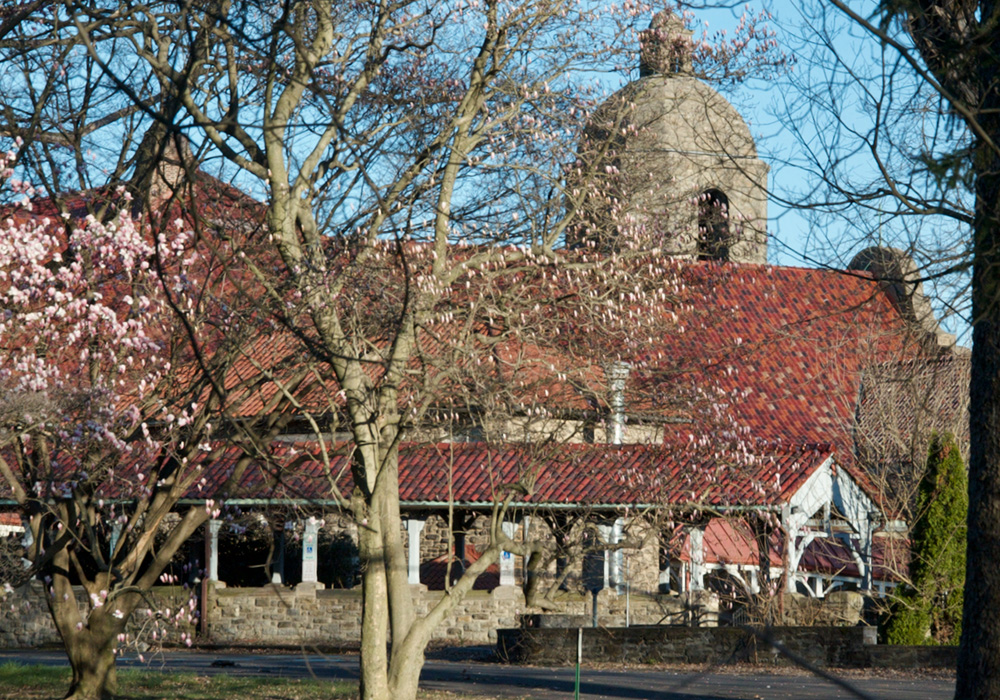
The former convent of the Sisters of the Blessed Sacrament is seen March 21, 2024, seven years after the sisters moved out to live in a retirement community. (GSR photo/Dan Stockman)
What was once unthinkable has become a blessing.
The Sisters of the Blessed Sacrament, who were founded by St. Katharine Drexel and once numbered more than 600 sisters, announced in 2016 they were selling their beloved convent and moving to a retirement community.
A year later, the last sisters moved out of the campus where St. Katharine had chosen and purchased the land, oversaw the construction of buildings, and lay interred and venerated in a national shrine for more than 60 years. A year after that, St. Katherine's remains were translated from the shrine to the Cathedral Basilica of Sts. Peter and Paul in Philadelphia.
It would have been easy to despair, especially since the sisters weren't moving into their own retirement home — they were moving 7 miles to Paul's Run Retirement Community, a Lutheran facility where most of the other residents are Jewish and much of the staff is Muslim. The chaplain is Presbyterian.
Sisters who had spent most of their lives in community now found their community was religiously diverse, and even co-ed.

The ecumenical chapel at Paul's Run Retirement Community has one tabernacle for the holy Eucharist, another for the Torah, and a basket of Muslim prayer rugs. (GSR photo/Dan Stockman)
"It's a wonderful community," said Sr. Faith Okerson, a member of the congregational leadership team. "We find ourselves ministering all day long and being ministered to — it's a two-way street."
Arnie Escourt, who moved in two years after the sisters did, admits he wasn't sure about living with about 50 Catholic nuns.
"As a Jew, I heard about 50 nuns, I said, 'What am I going to do with 50 nuns?' But it's one happy community. We're one big team," he said. "I knew nothing about nuns, but they're one of us."
Then Escourt turned to Sr. Judy Franz, also a member of the congregational leadership team.
"We're lucky to have you," he said.
A new kind of mission
Katharine Drexel, an heiress to a banking fortune, entered the Sisters of Mercy in 1889 and in 1891 established what was then known as the Congregation of the Sisters of the Blessed Sacrament for Indians and Colored People, dedicated to addressing the needs of Native Americans and African Americans, funding and establishing dozens of schools for children that otherwise would not be educated.
Her congregation, funded until her death in 1955 by her father's vast riches, grew and spread missions across the country, but like most congregations in the United States, has seen a dramatic decline in numbers since the 1950s. By 2018, there were only about 100 sisters, and half of those were in retirement.
"It's a very different future than we anticipated," Okerson said.
Except that the sisters now have a mission none of them expected: ministering to the community at Paul's Run.
The congregation had a long-standing tradition where anytime sisters were leaving on a mission, they would be sent off with a ceremony in the chapel, and the sisters of the motherhouse would line their path and wave white handkerchiefs as the missionaries left the building.
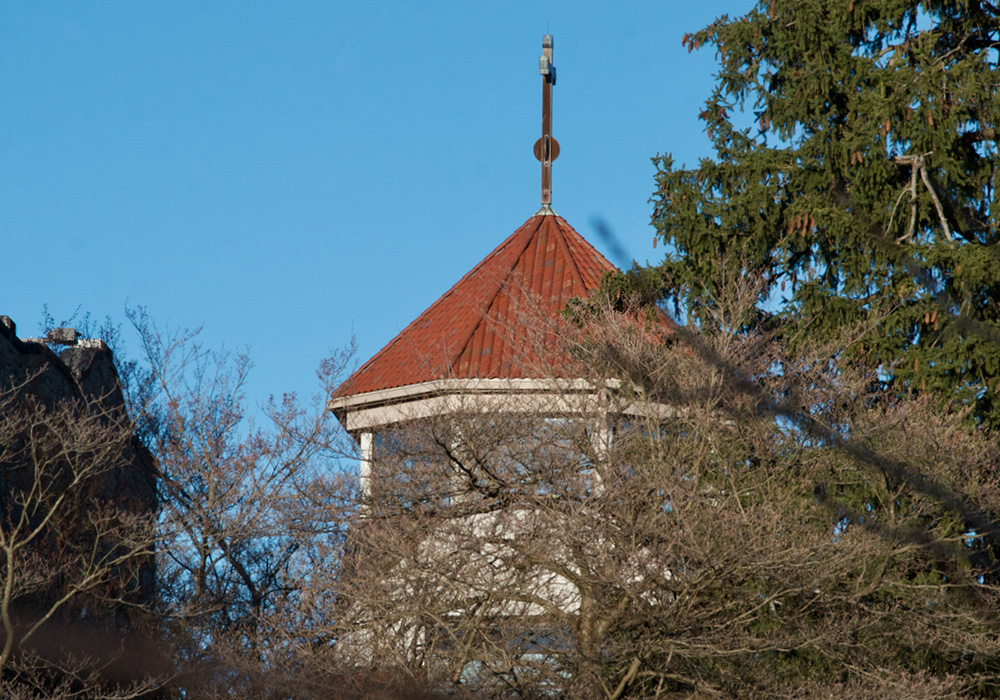
The former convent of the Sisters of the Blessed Sacrament is seen March 21, 2024, six years after the remains of St. Katharine Drexel, who founded the order, were translated to the cathedral in Philadelphia. (GSR photo/Dan Stockman)
So in 2017, when the sisters began moving out of the motherhouse — they went two or three at a time, twice a week — they continued the tradition for each group, telling them, "You are missioned to Paul's Run."
Still, "It was painful for many of the sisters," Okerson said, but they were stoic and said, "It's OK — we've always been missionaries."
Sr. Pat Downs said it goes back to the congregation's roots.
"Mother Katharine didn't want her sisters working in one community and living someplace else," she said. "We lived where we ministered."
Sr. Laura Cavanaugh said there was another adjustment, as well.
"There are so many white people here," she said. "We never saw so many white people in our missions. But we are so blessed."
Cavanaugh noted that while for many the convent meant everything, for others the motherhouse meant retirement and they tried to stay out of it as long as they could, wanting to keep their independence.
Advertisement
Now they have both community and independence at the same time. In the convent, sisters had their own bedroom while everything else was in common, Franz said. At Paul's Run, sisters have their own apartment, with their own kitchen. One sister said what she was most looking forward to was having her own bathroom.
"Here it's all yours," Franz said. "We're even living [on the same floor] with men!"
And while the convent had few activities for the aging sisters, Paul's Run has many — Escourt teaches a Bible class many sisters attend, there is a bell choir, an actor's group, a knitting and crocheting club, a general store where residents can volunteer and the list goes on.
When Downs visited Paul's Run before moving in, she didn't like the long corridors with closed doors, and she vowed to make a difference.
"I made up my mind that if I'm coming here, I'm not going to live in an institution, I'm going to live in community," she said. "And we have a wonderful community of Sisters of the Blessed Sacrament and a wonderful community within Paul's Run. This is my home."
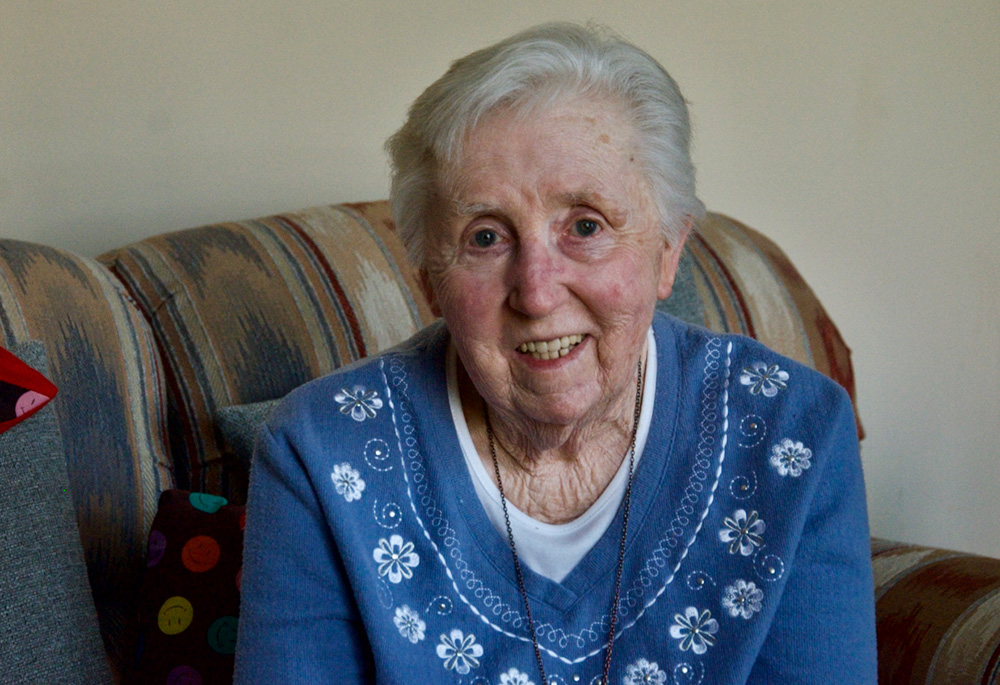
Sr. Pat Downs, of the Sisters of the Blessed Sacrament, talks March 21 about how the sisters see moving to a retirement community as just another mission. (GSR photo/Dan Stockman)
Living in community
The sisters looked at three facilities before choosing, but Paul's Run seemed to be chosen for them: The community had just finished a big renovation, so it had rooms available for all the sisters. That's not always easy to find.
"We needed a place, and we didn't have time to build," Okerson said.
Once the choice was made, leadership at both Paul's Run and the congregation knew that 50 people from any one group moving into the facility in just a few months would be an adjustment, so in addition to the sisters visiting the retirement community, current residents were invited to visit the convent before the moving process started.
One of the things the sisters liked best about Paul's Run was the ecumenical chapel, which has two tabernacles — one for the Eucharist and one for the Torah — as well as Muslim prayer rugs. And since the sisters moved in, the entire Paul's Run community has become more spiritual.
There used to be a Catholic communion service held once a week in the chapel; now there is Mass five days a week, and Sunday Mass has to be held in the auditorium to accommodate the crowd. Chaplain Michelle Wildridge said at least four sisters attend Friday evening Shabbat services, an ecumenical Lent service was packed — "a good quarter of the people who came to a Christian Lent service were Jewish," Wildridge said — there is now a weekly interfaith prayer group, sisters wrote notes to Muslim staff members to support them during Ramadan and it seemed the entire Paul's Run community participated in the Seder meal.
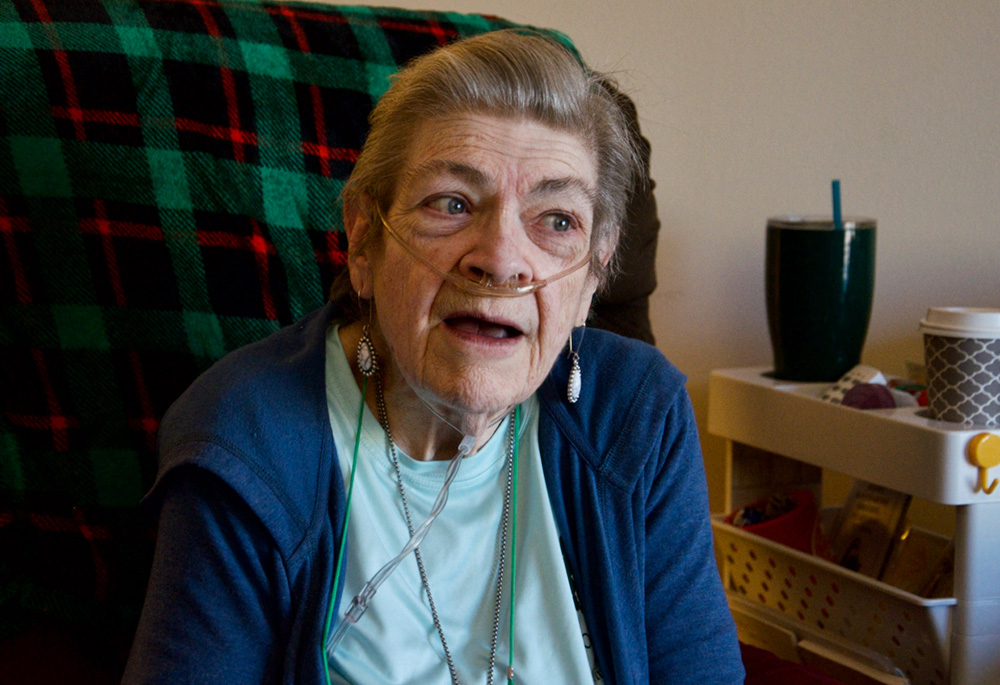
Sr. Carol Eden, of the Sisters of the Blessed Sacrament, talks March 21 about the pain of leaving the order’s motherhouse and the joy they've found since. (GSR photo/Dan Stockman)
Rebecca Michels, co-director of sales and marketing for Paul's Run, said the suddenly diverse facility has become a true community.
"For a lot of residents, this was their first experience being with nuns, let alone living with them," Michels said. "But watching these friendships blossom — it's not even about religion. They just support each other and their neighbors."
All of this is a marked change from the trauma of leaving the motherhouse.
"I still tear up about it," Sr. Carol Eden said. "But it was also an adventure."
Eden said she was warned by friends before the move to be careful she didn't offend any of her new Jewish neighbors. Then during the Christmas/Hanukkah season, one invited her to get their pictures taken with Santa Claus.
"I decided to listen to the people I live with instead of people on the outside who think they know what's going on," she said, adding that the important thing is to be open to learning from each other. "It's almost the same as when we went out to the Navajo Nation. You would get there and know nothing."
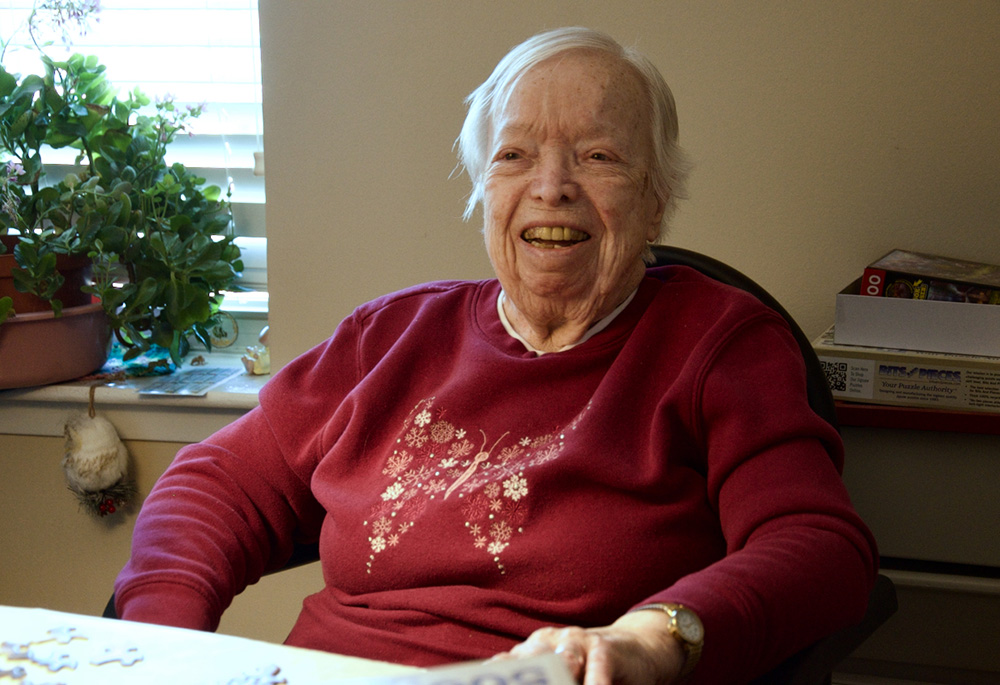
Sr. Lorraine Stein, of the Sisters of the Blessed Sacrament, talks March 21 about the community that’s been built since the congregation left its historic motherhouse. (GSR photo/Dan Stockman)
Eden said what might have been seen as the end instead has become a new beginning.
"I think Mother Katharine was smiling down on us, saying there's another way to show people what it's like not only to be a Catholic sister, but a follower of Jesus," she said. "We're like the powerhouse of prayer, and that includes our Jewish brothers and sisters."
Downs said the move has meant a new, beautiful way to live in community.
"You can have a desire for community, but it works two ways. … I think it's what we put into it," she said. "You never know how it's going to work, so it's about trusting God."
Sr. Lorraine Stein said she used to pray that God would help her know why she was there. Now, she said, it's clear she is there to be part of this community.
"Now I pray, 'If someone needs help, let me see that,' " she said. "They're good to us and we're good to them."







